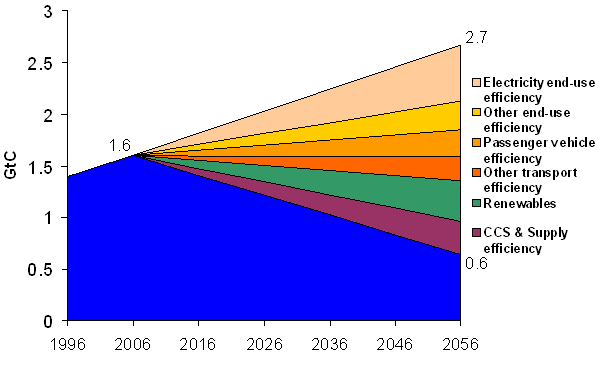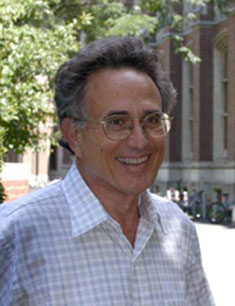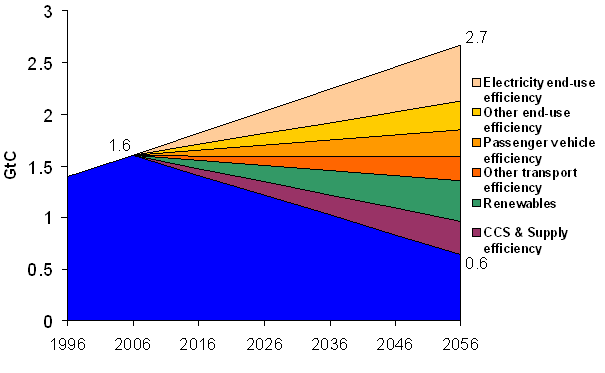 The blogosphere is all abuzz about recent comments from Princeton professor Robert Socolow, who along with fellow scholar Stephen Pacala developed the famous “wedges” approach to tackling climate change. (A wedge of nuclear, a wedge of solar, a wedge of efficiency, etc., and slowly you get that emissions curve down. That’s the basic idea anyway.) Socolow told National Geographic that he now regrets the wedges theory because “the world decided that dealing with global warming wasn’t impossible, so it must be easy.”
The blogosphere is all abuzz about recent comments from Princeton professor Robert Socolow, who along with fellow scholar Stephen Pacala developed the famous “wedges” approach to tackling climate change. (A wedge of nuclear, a wedge of solar, a wedge of efficiency, etc., and slowly you get that emissions curve down. That’s the basic idea anyway.) Socolow told National Geographic that he now regrets the wedges theory because “the world decided that dealing with global warming wasn’t impossible, so it must be easy.”
No really. That’s what he said: The problem is that the world now thinks dealing with climate change will be easy. And even more bizarrely, some folks — see Roger Pielke Jr. and Andy Revkin — seem to have greeted this surreal pronouncement with vigorous nods.
To which my initial reaction is, whaaaaaaaaaaat the FECK are you talking about?! I am rarely struck speechless, but this is like a transmission from Alpha Centauri. I barely know how to respond. But OK. Let’s try to back up a few steps.
Start with the obvious question: Who thinks tackling climate change will be easy? Raise your hand. Anyone? Bueller? [crickets]
I mean seriously, has anyone in the entire world ever said dealing with climate change is easy? I’d like to see just one quote to that effect. (Notably, Socolow, in the process of throwing around these wild generalizations, doesn’t actually cite anyone.)
When I wander out into the fetid swamp of American media and politics, here’s what I find: One of the two political parties denies that climate change exists. At all. (Though I guess, on some interpretation, that makes it easy to deal with!) Among the other party, there is a large faction from regions of the country where fossil fuels are produced, or cheap fossil fuels are consumed in great quantities; that faction might not deny climate change, but they decry and vote against every effort to address it, no matter how mild. Even tepid restrictions on externalities are a “war on coal” or “stifling domestic production.” (You might have noticed that Congress can’t even manage to roll back billions in subsidies to one of the industries that’s driving climate change.) That is the “centrist” position and the one most often reflected in the unconscious biases and narratives of the national media.
Then there’s a small faction of the Democratic Party — too small to create a winning legislative bloc — that takes climate somewhat seriously. Not enough to make it central to their campaigns or risk their electoral fate over it, but, y’know, seriously-ish.
So that’s the big picture: Thus far, the American political system, far from deeming tackling climate change “easy,” has deemed doing anything at all too difficult.
Now, let me draw your attention over to an obscure corner of the American political discussion, where folks like Joe Romm and Greenpeace and the Union of Concerned Scientists argue that climate change can be managed, and carbon targets met, even without the fantastical-but-unspecified tech “breakthroughs” that are, oddly, the hallmark of “realist” climate discussion.
For our current purposes, two things are important about the Romm take on climate:
- Romm, Greenpeace, et al are not “the world.” They have very little political power. They have virtually no voice in mainstream media. No politician fears them; few of the self-styled arbiters of public dialogue take them seriously.
- Neither Romm nor Greenpeace nor anyone else has ever said anything that can remotely be construed as stating or even implying that tackling climate change will be “easy.” What they argue is that it is physically and technologically possible assuming a massive, historical crash program of reindustrialization that all of them, without exception, acknowledge is unlikely for political reasons.
Again: not “easy.” Possible. Possible but extraordinarily difficult and unlikely. And that’s the maximally optimistic view!
 Socolow: “The hippies stole my model!”So where is this “world” that has deemed climate “easy”? WTF is Socolow talking about? I think you can find everything you need to know in his stray but telling comment that “our paper was outflanked by the left.” You see, the wedges framework was adopted by … y’know, those people. Activists. (The very word invites haughty sniffs from Serious People.) The hippies started adapting the wedges framework in service of more ambitious goals, trying to show that there is an available physical and technological path to a happy, prosperous, climate-stable future.
Socolow: “The hippies stole my model!”So where is this “world” that has deemed climate “easy”? WTF is Socolow talking about? I think you can find everything you need to know in his stray but telling comment that “our paper was outflanked by the left.” You see, the wedges framework was adopted by … y’know, those people. Activists. (The very word invites haughty sniffs from Serious People.) The hippies started adapting the wedges framework in service of more ambitious goals, trying to show that there is an available physical and technological path to a happy, prosperous, climate-stable future.
We can’t have that. No fate holds more horror for Serious People than to be associated with the left, with enviros, with activists, with hippies. Serious People do not indulge in optimism; their job is to explain that, no matter how hard or big you think climate change is, it’s actually harder and bigger than that. No matter how little you think we can do about it, we can actually do less. (Vaclav Smil is the master of this genre.) The whole mission in life of Serious People is to set themselves apart from silly, emotional, unrealistic hippies.
So to have a framework you developed being championed by hippies? The horror. I mean, my God, people are going to start thinking Socolow is an optimist! That he has hope! That is so unserious.
What I don’t understand — what I’ll never understand — is what the goal of comments like Socolow’s (and Pielke Jr.’s) is supposed to be. The presumption seems to be that optimism is horrendously dangerous, that above all we must avoid letting people think the problem is solvable. It’s incredibly important that everyone adopt the proper degree of fatalism. But … why? Whether Romm or Socolow is right, there’s an enormous, difficult, and uncertain challenge ahead. Whether we have 100 miles to go, or 200, or 500, it doesn’t change the fact that we’re currently standing still. Whether innovation or deployment ultimately proves more important, the fact remains that we need a ton of both and we’re not doing a damn bit of either.
Does Socolow understand that pessimism is profoundly demotivating? That no one will accept a problem of this size unless they feel a sense of efficacy and possibility, like there’s actually something meaningful they can do about it? What does he think is going to happen if the hippies adopt his dour take on things? Will that prompt more action? Will it mobilize more people?
I don’t get it.
Editor’s note: Joseph Romm talked to Socolow about the controversy and found that he stands by his landmark 2004 “wedges” paper.



